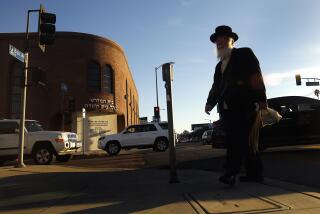THE SCENE : Tripping the Light Israeli
- Share via
Every Friday night at Victor Dru’s Hollywood Dance Center on Highland Avenue, anywhere from 50 to 100 men and women of assorted ages, nationalities and ZIP codes, gather in the dim light to twirl and bob and leap to music blaring from speakers at disco decibels. The music has lyrics that seem at first rather odd, undecipherable. Then you realize that the words aren’t English, they’re Hebrew. The dancers all seem to know what they’re doing and no wonder. They are all devotees of a small but dedicated L. A. night-life scene: Israeli dancing.
This gathering, run by DJ and choreographer Israel Yakovee, is one of about 30 Israeli dance events that take place every week in Southern California. Israeli dance clubs hit their peak in L. A. in the late ‘70s and early ‘80s. Today, only Cafe Danssa on Pico Boulevard in West Los Angeles offers Israeli dance regularly, but it can be found in other venues--at Jewish community centers, dance studios, college campuses or after services at synagogues. Commonly, the evening starts with a lesson or two, followed by dancing.
Edy Greenblatt, a West L. A. dance teacher and dance ethnologist who has studied the form, calls it “one of the most important dance phenomena today” because of the numbers who participate--an estimated half-million in more than 30 countries. Israeli dance was born in the ‘40s as part of an attempt to develop a distinct Israeli culture in the new Jewish state, Greenblatt says. Then, dances were done to traditional songs played on accordion. Today’s dances--the repertoire has swelled to more than 1,500--are choreographed to popular tunes recorded in Israel, with rhythms sometimes borrowed from Russia, Greece, Arab countries or Latin America, she says. They are performed in circles, lines, individually or in couples.
There are about a dozen Israeli dance teachers in the L. A. area, and a handful of prominent choreographers, creating a lively local dance community. And if you’re willing to look a little foolish at first, it doesn’t take long to get the hang of it.
“You need absolutely no talent,” says Greenblatt, 31. “You don’t have to be a Jew, an Israeli or speak or understand Hebrew. You don’t have to be young, you don’t need a date. You just need to show up.”
More to Read
The biggest entertainment stories
Get our big stories about Hollywood, film, television, music, arts, culture and more right in your inbox as soon as they publish.
You may occasionally receive promotional content from the Los Angeles Times.










